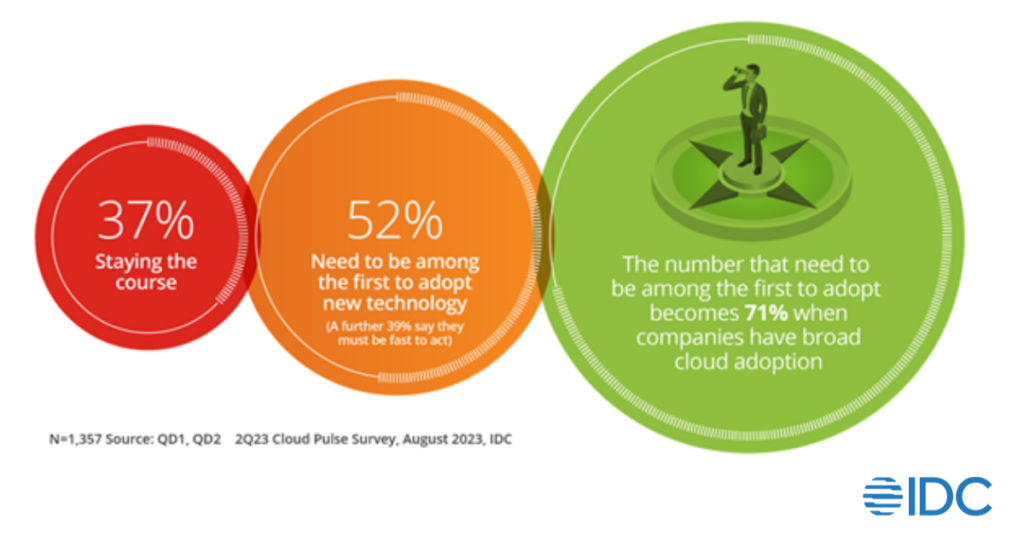The technology landscape is rapidly evolving. External pressures placed upon the business, coupled with innovations across IT – from developments in hybrid and multicloud, to the introduction of commercial Generative AI – are placing an increasing amount of attention on cloud computing. Evidence shows that those organizations with a focus on building hybrid and multicloud foundations benefit most from having the ability to rapidly adopt new technologies at scale as they initiate new products and services and drive cost and resource efficiencies across the business.
This realization is causing seismic shifts, not only around how cloud is consumed but how cloud buyers make investment decisions and measure return on investment. To capture these changes in the market, International Data Corporation (IDC) has launched a new Continuous Intelligence Service (CIS) called Cloud Adoption Trends and Strategies that has been designed to uncover the changing requirements of the cloud buyer.
Cloud Adoption Trends and Strategies provides insight into what drives cloud buyers to make certain decisions as they purchase cloud computing and the services and applications that will live in the cloud. Now, more than ever, the cloud market requires deep understanding in the way organizations are looking to create a more customized cloud experience. Cloud service provider, platform, hardware, and application choices will influence how cloud buyers’ businesses progress through future digital transformation projects, especially those surrounding data and AI. These are all covered in depth in Cloud Adoption Trends and Strategies.
Cloud – A Foundational Choice With Tangible Benefits
Cloud adoption drives innovation. The following image shares results which show a competitive advantage in terms of new technology adoption for buyers with broad cloud estates.
Are cloud buyers innovating or ‘staying the course’ in 2023?

Cloud teams have had to pivot fast over the last few years to be pandemic-prepared, inflation-proof, and to meet a raft of new demands, from rationalization to competitive business operations. Many have had to think on their feet, reduce development times for new projects, and find ways to be savvy despite a cloud skills shortage.
The number of cloud buyers that say their business is ‘staying the course’ in terms of attitude towards innovation is slightly higher this year than last. More than half of cloud buyers, however, recognize they need to be among the first to adopt new technologies to stay ahead of the game, and a large proportion that may not be fast movers say their business still wants to be ‘fast to act’. These figures already show that cloud buyers are placing emphasis on innovation. When looking at cloud budgets, IDC finds that around half of that budget is, in fact, attributed to new projects and innovation, as opposed to cloud operations and maintenance.
For cloud buyers that are already mature in cloud (many of which will already be adopting hybrid and multicloud strategies) the focus on adopting new technologies is much higher than the average cloud buyer – 71%. These organizations have laid foundations that foster innovation. Building out hybrid and multicloud environments enables them to free up financial and human resources and encourages them to innovate by providing access to new technologies and deployment models.
The Different Cloud Conversation
In 2023, the cloud buyer’s conversation with those supplying products and services is different to what it was even a year back when a lot of conversations were focussing on cost. There is still a strong focus on innovating and delivering new products, but cloud buyers also demand outcomes around data-driven strategies, with many taking a data and application-first approach to deploying on cloud. Conversations around interoperability, contractual choice and ecosystems and marketplaces all factor highly. These are happening at the same time as customers are demanding options that enable them to have choice around underlying hardware, and guarantees around performance and latency, connectivity, scalability, and options for cloud management, sustainability, and operational efficiency.
How vendors approach these conversations can make a huge difference. In Q3 2023, IDC Cloud Pulse found that improved customer services led many cloud buyers to increase their spend with a cloud provider. A misalignment of performance requirements and resource requirements led to decreases in spend. Over a fifth of cloud buyers with broad cloud footprints that chose to discontinue services with a provider said the main reason for doing so was because they found a vendor with a more appealing switch plan, and those with newer cloud deployments were impacted by a perceived lack of expertise and poor customer service. The ability to tailor products, services and guidance for these organizations can make or break a cloud rollout and a cloud contract.
It is not just the cloud service providers that need to pay careful attention – 60% of companies deploying cloud today also employ professional services for delivery and management of their cloud services (Cloud Pulse Q3 2022).
Understanding the Cloud Buyer
Drawing upon insights uncovered from IDC’s quarterly Cloud Pulse survey, Cloud Adoption Trends and Strategies can provide insights into how cloud buyer’s requirements differ across industry verticals, regional markets, and types of organizations. As the cloud market becomes increasingly hybrid, cloud demands themselves are becoming more individual, and complex. Just as cloud buyers have a head-start on innovation when laying hybrid and multicloud foundations, service providers and vendors can have a head-start on understanding cloud buyer requirements by learning about their challenges and business needs.
For more information on Cloud Adoption Trends and Strategies, contact IDC research director Penny Madsen at pmadsen@idc.com.
Additional Resources:
- IDC solutions for teams requiring custom data-driven strategies.
- Business Value support and solutions




